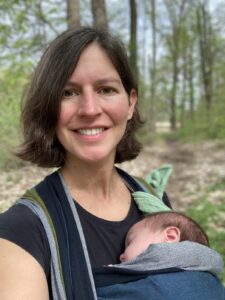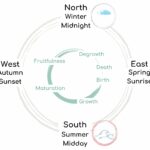Wild Coaching
From Birth to Rebirth: How Motherhood Transformed Me
This spring, I gave birth to my daughter. When she was born, I felt as if I was reborn too. Overnight, I stepped into a new role with a whole new set of responsibilities, as well as gifts. Giving birth marked the end of my life as I had known it, and the beginning of a new, unknown path that scared me. I had no idea what that journey would entail and who I may become as a mother.
The Birth of a New Life and a New Self
The moment the midwife placed that tiny, vulnerable, and needy human being, who had finally made her way out of me, on my chest, I experienced the start of a lifelong bond. I looked into her dark eyes, and I was in awe. What a wonder!
Just a few minutes later, the doctor began stitching me up to stop the ample bleeding. The moments of falling in love with my daughter were interrupted by moments of pain in my most sensitive parts, while my whole body still trembled with exhaustion.
I endured the pain of labor for over 24 hours with an inner calm. I focused on breathing and the relaxation techniques I had learned. It was hard, but I wasn’t afraid. Even when the intense pain of the final stage hit, I knew I “just” had to trust my body and fully let go. And then, surprisingly fast, in just a few surges, my daughter was born!
The Real Challenge: The Journey After Birth
What I didn’t expect, however, were the challenges and pains that came in the weeks and months after giving birth. That journey often felt endless and took me to some dark places.
After giving birth, I slept for a few hours before being awakened by her cries. We had to learn how to breastfeed quickly, as I couldn’t bear to see her in distress. I had to sit still while she ate, despite the pain in my back, arms, and neck. I had to do it even when I was sleep-deprived. I had to stay calm and reassure her, even when I felt like screaming in frustration, desperate to escape the situation.
But there was no other choice. I wanted her to live, to be fed, to be at peace. That became the priority, no matter what the “price tag” of pain and self-restraint was.
We had a rough start. The weeks following her birth were an intense mix of growing love, wonder, and amazement at what our bodies can do – paired with moments of physical pain in so many parts of my body, exhaustion, and the feeling of being forced to do things. I felt like I had lost the freedom to meet my own basic needs – like sleeping, eating, washing, and even going to the bathroom – on my own schedule.
It felt as though the boundaries of what I could give had been crossed. I couldn’t nurse and provide constant comfort by letting her be at my breat all the time. It was too much. Yet, I kept doing it anyway.
The Power of Self-Love and Seeking Help
When I fell into an inner state in which I feelt powerless, as if I’m sacrificing myself and have no freedom to chose, I tried to offer myself empathy and love. I welcomed the voices that said it wasn’t okay to push past my boundaries, acknowledging that awful feeling of violation rather than pushing it away. I also sought help: I got more support with caring for my daughter, went for a full-body massage, took Somatic Experiencing (SE) trauma release sessions and when I felt ready invited friends to celebrate my transition in a circle women. Gradually, something in me softened.
Falling Deeper in Love with Life: A Mother’s Purpose
As well, every time I would look at my daughter sleeping like a little angel, that inner sense of rebellion would fade. I fell more deeply in love with her – so beautiful and innocent. I reminded myself that everything I was going through was for her. It was for the wonder of that life. It was for the wonder of life.
Day after day, week after week, and month after month, I grew into my new role as a mother (and I’m still growing into it, even as I write this).
As a mother, I’ve come to know that:
- My body can endure a great deal of pain while still nourishing and comforting. This makes me feel powerful, even fearless at times.
- The boundaries my mind set about what I need, when, and how have softened. They’ve become more flexible.
- Even when part of me feels trapped and sees no way out, with self-love, patience, and seeking support, I keep moving forward.
- Making sacrifices in service to another human being enables me to go beyond what I thought possible, all while filling me with a profound sense of purpose.
- Being in “Service of Life” has gained a humble, yet empowering and all-encompassing meaning.
Becoming a Parent is a Proper Rite of Passsage
I believe that the transition into motherhood for every woman (and into fatherhood for every man) is unique. It brings its own challenges and opportunities for growth. But I now have a deeper understanding of what all mothers go through. Mothers and fathers are superheroes – they are amazing! No matter how they’ve navigated their challenges, they’ve endured countless storms and kept moving forward, reinventing themselves over and over again. And that’s a lot.
I also see how the transition into motherhood is a proper rite of passage. It includes a full-body experience involving pain and hardship, as well as moments of wonder and aliveness. It brings with it a desire to serve, whether a person or a community, and calls for trust in life and support from the community around us.
Yet, I sense that in our fragmented society of small family units, this important rite of passage is often under-supported and hear the desire to explore how I could contribute to change this.





